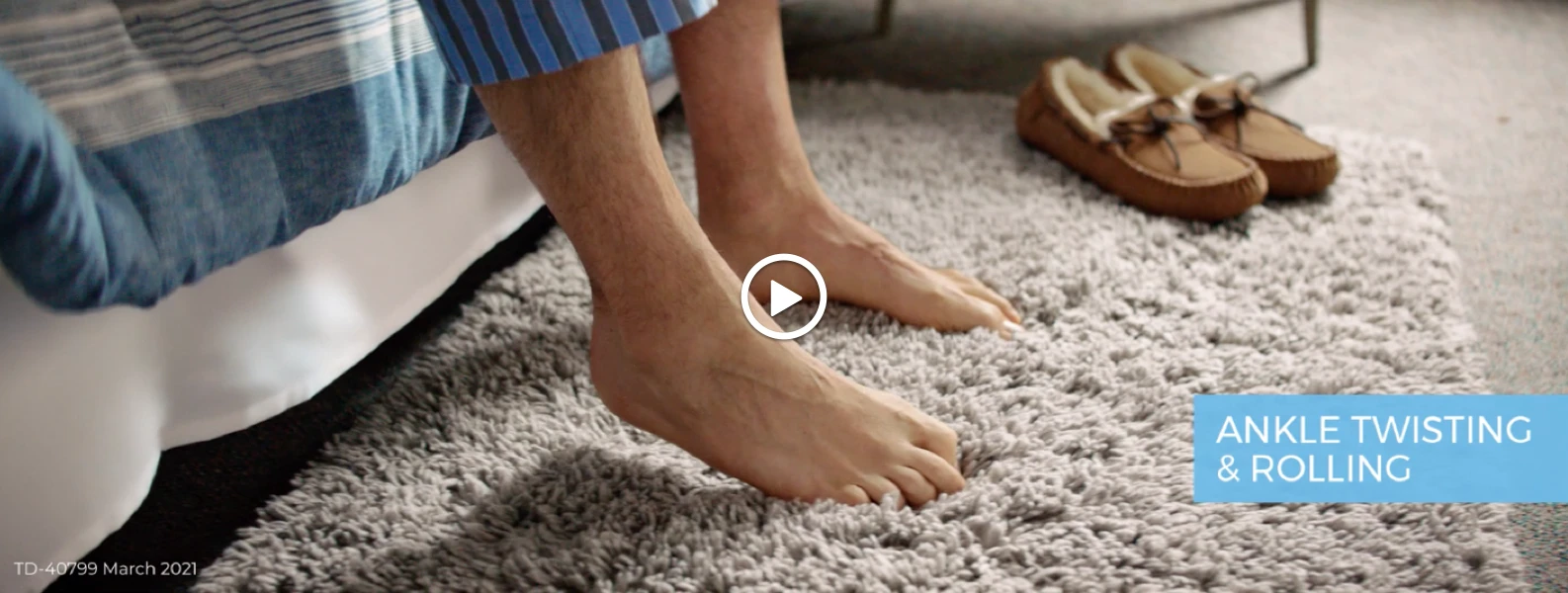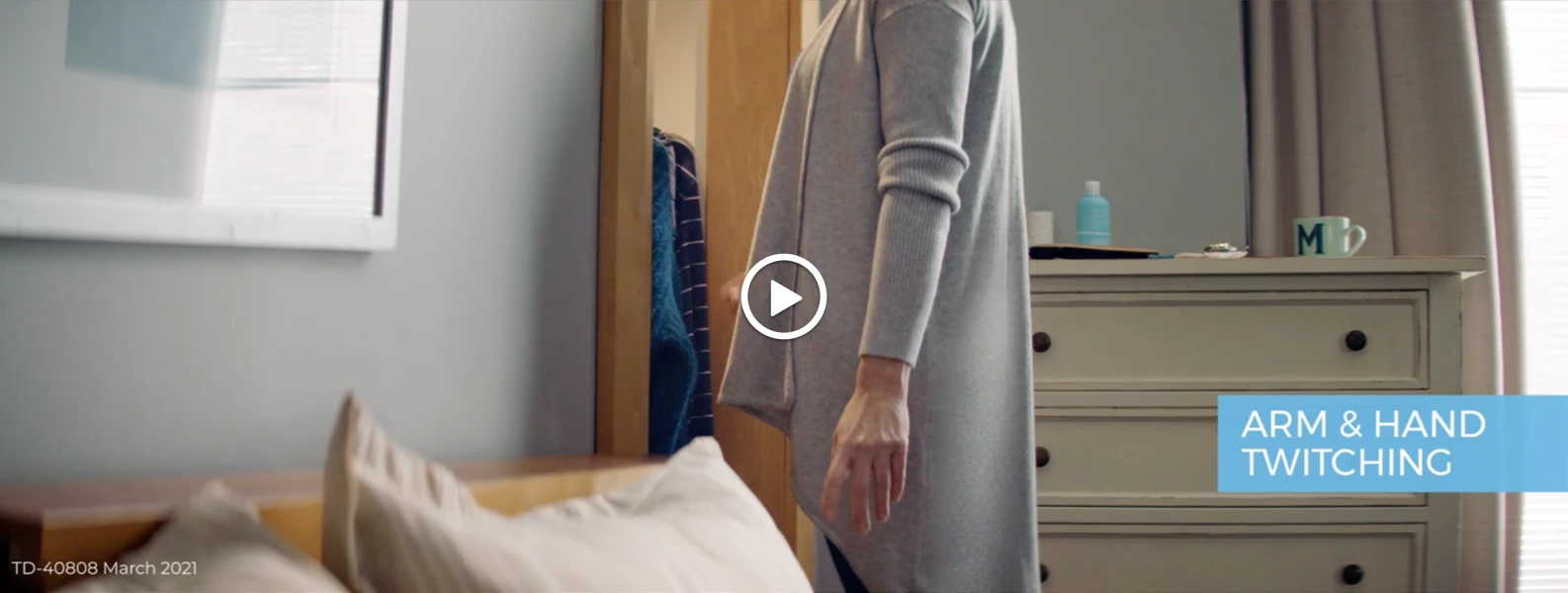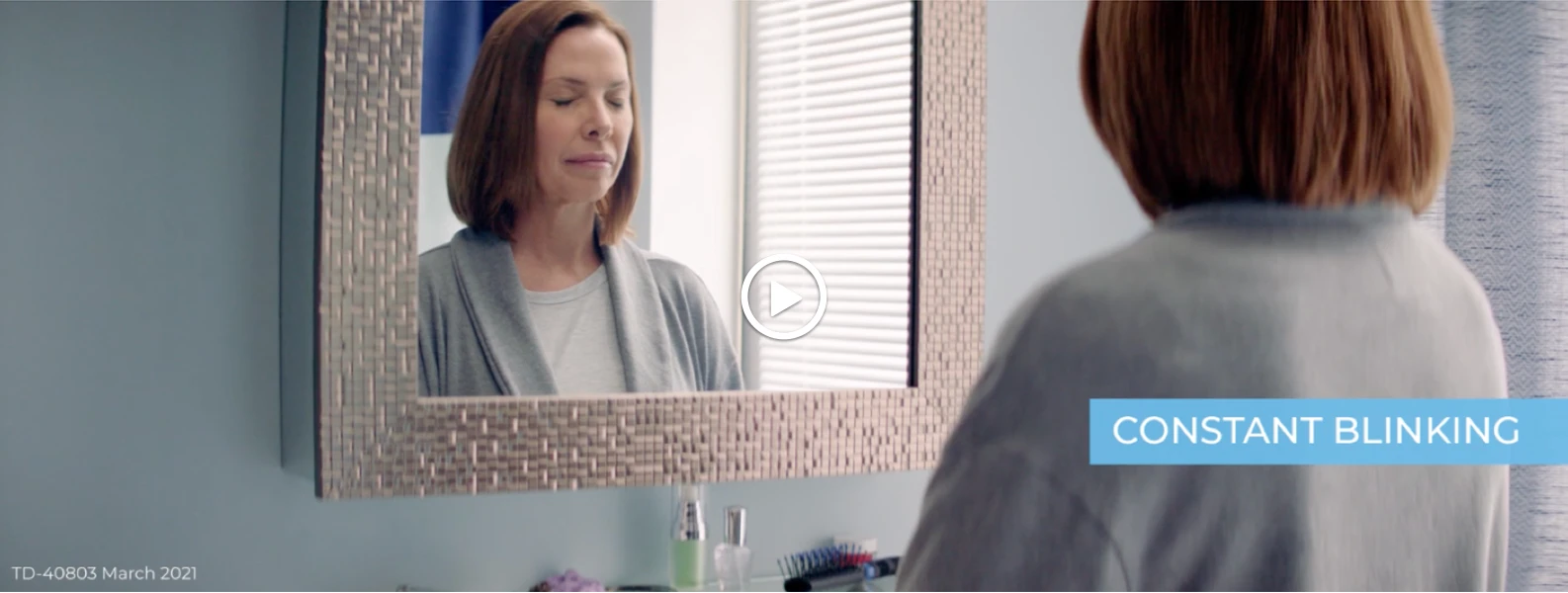Hear from real people with TD
Some people with TD recall not noticing their
movements until
family members
pointed them out.
TD is a movement disorder that involves repetitive and uncontrollable body movements.
Long-term and even short-term use of certain prescription medications used to treat mental health or gastrointestinal conditions can cause TD. In fact, TD can even develop after these medications are stopped, changed, or their dose is reduced. TD is more than a side effect of these medications—it’s a real condition with its own diagnosis and treatment plan.
The uncontrollable movements appear as twitching, shaking, or jerking in the face, arms, legs, and trunk and may be described as:
Movements like these are the visible signs of TD, but the impact of TD is more than physical. Uncontrollable movements can affect a person emotionally, socially, professionally, and in other aspects of their life.
It’s possible to stay on your mental health medication and treat TD at the same time
Once-daily AUSTEDO XR contains the same active ingredient as twice-daily AUSTEDO® (deutetrabenazine) tablets. Data on this page is based on twice-daily dosing.
Healthcare providers don’t always see or ask about uncontrollable movements, which is why it’s important to share what
you’re experiencing during your appointment. Watch these videos to see what symptoms can look like.






See the symptoms
No matter where you are with
treatment or diagnosis, we can
help you get the conversation
going with your healthcare provider.
Get patient support, treatment information, and downloadable
resources to stay on track with AUSTEDO XR.
Get more information about what to expect if you decide to treat
with AUSTEDO XR.
TD can be a struggle both physically and emotionally. Uncontrollable movements can make it difficult to perform everyday tasks and activities, and the emotional impacts can be just as burdensome.
In a recent study, many adults diagnosed with TD reported that it impacted their life, even if movements were mild. Movements of any severity can cause embarrassment and increased anxiety in social settings, which can lead to withdrawal and isolation. Emotional impacts like these are a valid reason to talk to a healthcare provider about treatment to reduce TD movements.
No clinical trials have been conducted to suggest treating TD affects these outcomes.

Now Playing:
Rachel's story
Hear Rachel, a real person living with TD, share her journey.
Video Transcript:
Hi, I'm Rachel. I'm a grandma and a mother. When I was 18, I was diagnosed with schizophrenia. I really didn't have a big, base for, you know, people in my family that understood about schizophrenia and knew about schizophrenia. I just knew that I was sick, and I would spend months in the hospital, and it just went on for years. I went to the doctor, and she prescribed me medication and the medication that she prescribed me, I was on for like, 16 years. I ended up getting drug induced tardive dyskinesia. I didn't know from taking a medication that I could get a disease.
I went to the doctor, and I pleaded with her. I told her, please listen to me. Something's going on with me. My hands are shaking. You know, at that point, my hands were like this. My head was bobbling around like this. I lost the feeling in my legs. My legs wouldn't hold my body anymore, and it just got so bad. I noticed it first in my hands and then and then I started getting very upset when it started going to my face. My tongue was like this. All day, my tongue just kept sticking out of my mouth, sticking out of my mouth. For the longest time, I didn't want to go outside. I was too ashamed to go outside. I was too ashamed to talk to people and be around people because of the movements. They were so embarrassing. That really hurt my feelings was the cruel, cruelness people had towards me, with making fun of me. They had problems with me. Why are you talking like that? You sound drunk. Why? Why is your tongue sticking out? Why are you walking like that? And then they sent me to another doctor. And he noticed that I had the tardive dyskinesia. When I was diagnosed with the tardive dyskinesia, I was devastated. It finally gave a name to something that I didn't know that could possibly happen to me from taking medication that I was prescribed.
When I started taking the AUSTEDO, I started noticing first my hands started smoothing out where they weren't tapping so much. My fingers weren't tapping so much, and then they started just going straight. They just leveled out. Then I noticed that my mouth movements, my tongue started to stay in my mouth more. My doctor was able to find the right dosage for me of the…the XR. The AUSTEDO XR reduced my movements. AUSTEDO lessened my movements so much, that I was just stunned and…and I couldn't believe it. It made me feel so wonderful. It made me feel fulfilled. It made me feel…it made me feel that there's…there's hope.
With the relief from AUSTEDO that I get, I can now play with my grandkids. I can make bracelets with my beadwork. I can do my woodwork. I can go and play with my kids. I can go for walks now. With less TD movements, I'm able to do more things now. It just took everything and turned it around and made me be able to be alongside of people again. Now I can hold my own cup. I can brush my teeth. I can clean the house. I can drive again. I can do things that I couldn't do. The AUSTEDO XR has made a difference in my life because it's allowed me to cope without shaking around. My hands and my face and my legs. It's important to know about my story because there's so many people out there that have it and they're ashamed. You know, TD is not your fault. You can do something about it like I did. You can ask your doctor for medication. I would tell somebody that had uncontrollable movements to go and get checked out for tardive dyskinesia to see if they need to have AUSTEDO XR for their medications. And now, now, because of the AUSTEDO, I'm…I'm back…back, I'm back, baby, I'm back.
AUSTEDO XR is a prescription medicine used to treat tardive dyskinesia in adults. AUSTEDO XR can cause depression, suicidal thoughts, or actions in patients with Huntington's disease. Pay close attention to and call your doctor if you become depressed, have sudden changes in mood, or have suicidal thoughts. Don't take if you have liver problems, are taking reserpine, tetrabenazine, or valbenazine. AUSTEDO XR may cause irregular or fast heartbeat, or abnormal movements. Seek help for fever, stiff muscles, problems thinking, or sweating. Common side effects include inflammation of the nose and throat, insomnia, and sleepiness.
Now Playing:
How to diagnose Tardive Dyskinesia (TD)
Hear professionals discuss diagnosing TD and treatment.
Video Transcript:
How to Diagnose TD: Professional Insight
Hear professionals discuss diagnosing tardive dyskinesia and treatment.
IMPORTANT SAFETY INFORMATION
AUSTEDO can cause serious side effects in people with Huntington’s disease, including: depression, suicidal thoughts, or suicidal actions. Do not start taking AUSTEDO if you are depressed (have untreated depression or depression that is not well controlled by medicine) or have suicidal thoughts. Pay close attention to any changes, especially sudden changes, in mood, behaviors, thoughts or feelings. This is especially important when AUSTEDO is started and when the dose is changed. Call your healthcare provider right away if you become depressed, have unusual changes in mood or behavior, or have thoughts of suicide.
Individual results may vary.
Please see the Important Safety Information at the end of this video.
When diagnosing the patient with Tardive Dyskinesia, we’ll do a history and physical. So we’ll do a past medical history, do you have any history of, major depression, bipolar disorder, gastroparesis or, you know, diabetes, and then what medications have you been put on? Have you been put on any medicines that block dopamine?
We look at how many years they’ve been exposed to antipsychotics. We look at how old they are, what was their baseline psychiatric illness? All of the factors which would be risk factors for developing tardive dyskinesia, we gauge that…many times they’ll say that they’re restless. They can’t sit still. They just don’t feel comfortable in their skin. They’re always moving around. When they’re trying to fall asleep, they’re always sort of going back and forth. Their legs are always moving. Uh, and so they just sort of feel restless. Um, and so many times the family members will just say, “Gosh, they’re just kind of twitchy all the time. You know? They’re always twitching and, and jerking and that sort of thing.”
…Primarily it affects the face and the mouth area, but can affect anything with, um, any, any muscle in your body. Primarily, your upper extremities like your hands. Um, it can affect your lower extremities like your feet, and it can affect your torso and up into your neck. Once we’ve got a good solid history, which is pointing towards tardive dyskinesia, we do a physical exam. And many practitioners simply examine the patient to look for abnormal movements. But there are also scales available, which are validated for us to gauge for the severity of tardive dyskinesia.
…I examine the patient using the abnormal involuntary movement scale, uh, where I rate them as a series of seven areas that I look at and rate them from zero being no movement, to four being very severe movement. And then I total that up, and that gives the score.
…Somebody might have minimal or mild symptoms according to a scale like the abnormal involuntary movements scale…but that could be highly disabling for that individual. If it’s affecting their interpersonal life, their occupation, their domestic setting, it’s oftentimes going to evoke embarrassment and avoidance.
Now what is important for patients to understand is, it does not matter to your provider what the final tally score is. What matters is, how disabling it is for the patient.
…When people’s quality of life goes down, it’s like you and I, we want as solid of an experience of life as we can, can possibly can. And I believe in the golden rule. So, you know, when you place yourself in someone else’s shoes and you see what’s happening with them based on the fact that they have a clinical diagnosis of something, it’s important to let them know that they can do something about that.
We know that from both statistics and from surveys, that it can be…physically…disabling. So why would you leave a disorder as such untreated, which can potentially impact the person in multiple ways? There’s a great degree of heterogeneity, which means variability among people, but it’s kind of nice knowing that we have agents that can help us with a really bad problem that we’ve lived with for many years without really having a solution for it. Before, uh, you know, we would treat patients with antipsychotics and we’d say that you have the possibility of having involuntary movements as a part of this treatment. And in the past, we would always say, well we have to just live with it. .... Today, we don’t have to make that trade off. We can treat the involuntary movements, or the tardive dyskinesia, should they arise.
…When someone suspects that they’ve got a problem, the best move is always seeking out one’s doctor, if that doctor knows what they’re doing, even if they don’t know what’s going on, they’re gonna seek out a second opinion or seek out a movement disorder specialist or somebody that they know clearly feels comfortable diagnosing and treating individuals with involuntary movements. So I’d say that’s a first step, seeking out the appropriate attention and help and then maybe being led down the path of finding the right medicine for them.
Approved Use
AUSTEDO is a prescription medicine that is used to treat adults with movements in the face, tongue, or other body parts that cannot be controlled (tardive dyskinesia).
It is not known if AUSTEDO is safe and effective in children.
IMPORTANT SAFETY INFORMATION
AUSTEDO can cause serious side effects in people with Huntington’s disease, including: depression, suicidal thoughts, or suicidal actions. Do not start taking AUSTEDO if you are depressed (have untreated depression or depression that is not well controlled by medicine) or have suicidal thoughts. Pay close attention to any changes, especially sudden changes, in mood, behaviors, thoughts or feelings. This is especially important when AUSTEDO is started and when the dose is changed. Call your healthcare provider right away if you become depressed, have unusual changes in mood or behavior, or have thoughts of suicide.
Do not take AUSTEDO if you:
have Huntington’s disease and are depressed or have thoughts of suicide.
have liver problems.
are taking a monoamine oxidase inhibitor (MAOI) medicine. Do not take an MAOI within 14 days after you stop taking AUSTEDO. Do not start AUSTEDO if you stopped taking an MAOI in the last 14 days. Ask your healthcare provider or pharmacist if you are not sure.
are taking reserpine. Do not take medicines that contain reserpine (such as Serpalan and Renese-R) with AUSTEDO. If your healthcare provider plans to switch you from taking reserpine to AUSTEDO, you must wait at least 20 days after your last dose of reserpine before you start taking AUSTEDO.
are taking tetrabenazine (Xenazine). If your healthcare provider plans to switch you from tetrabenazine (Xenazine) to AUSTEDO, take your first dose of AUSTEDO on the day after your last dose of tetrabenazine (Xenazine).
are taking valbenazine (Ingrezza).
Other possible serious side effects include:
Irregular heartbeat (QT prolongation). AUSTEDO XR and AUSTEDO increases your chance of having certain changes in the electrical activity in your heart. These changes can lead to a dangerous abnormal heartbeat. Taking AUSTEDO XR or AUSTEDO with certain medicines may increase this chance.
Neuroleptic Malignant Syndrome. Call your healthcare provider right away and go to the nearest emergency room if you develop these signs and symptoms that do not have another obvious cause: high fever, stiff muscles, problems thinking, very fast or uneven heartbeat, or increased sweating.
Restlessness. You may get a condition where you feel a strong urge to move. This is called akathisia.
Parkinsonism. Symptoms include: slight shaking, body stiffness, trouble moving, trouble keeping your balance, or falls.
Sleepiness (sedation) is a common side effect of AUSTEDO XR and AUSTEDO. While taking AUSTEDO XR or AUSTEDO, do not drive a car or operate dangerous machinery until you know how AUSTEDO XR or AUSTEDO affects you. Drinking alcohol and taking other drugs that may also cause sleepiness while you are taking AUSTEDO XR or AUSTEDO may increase any sleepiness caused by AUSTEDO XR and AUSTEDO.
The most common side effects of AUSTEDO in people with Huntington’s disease include sleepiness (sedation), diarrhea, tiredness, and dry mouth.
The most common side effects of AUSTEDO in people with tardive dyskinesia include inflammation of the nose and throat (nasopharyngitis) and problems sleeping (insomnia).
These are not all the possible side effects of AUSTEDO. Call your doctor for medical advice about side effects. You are encouraged to report side effects of prescription drugs to the FDA. Visit www.fda.gov/medwatch or call 1-800-FDA-1088.
For more information about AUSTEDO, please see the Medication Guide available at AUSTEDO.com or by calling 1-800-887-8100.
Some people with TD recall not noticing their
movements until
family members
pointed them out.
Whether you're ready to talk to your healthcare provider about
uncontrollable movements or still trying to figure out what to say, we have
an Appointment Preparation Guide to help you
start the conversation.
The information on this site is intended for healthcare professionals in the United States. Are you a healthcare professional in the United States?